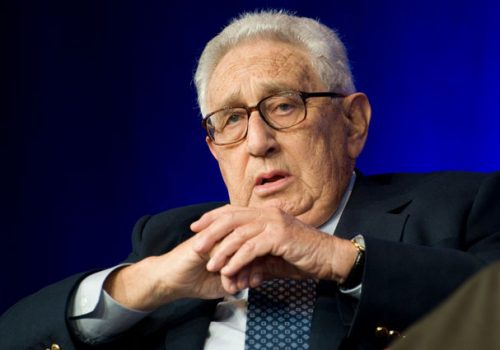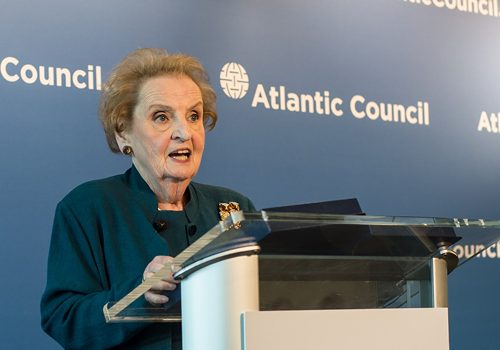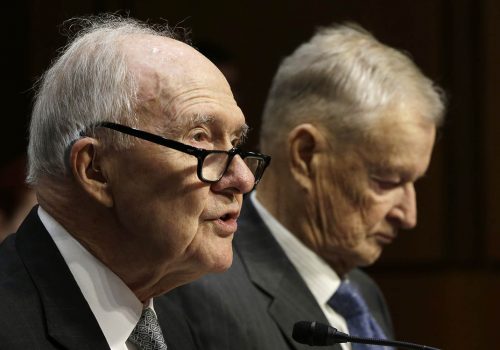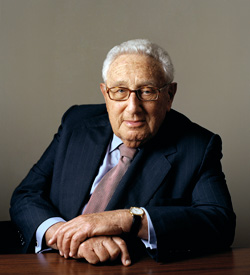A tribute to Henry Kissinger, brilliant strategist and consummate Atlanticist
There’s a little-known story about Henry Kissinger that is nonetheless essential to understanding this unique individual on the occasion of his death at age one hundred—since loyalty was as much a part of his makeup as was strategic brilliance and self-deprecating humor.
Almost every week for more than thirty years, Kissinger would phone General Brent Scowcroft, who served as his deputy when he was President Richard Nixon’s national security advisor, to talk about world affairs and to compare notes on national and world leaders. These calls continued even more religiously after Scowcroft’s health began to deteriorate, and they didn’t stop until Scowcroft’s passing in August 2019.
Any understanding of Kissinger’s contributions to a better world would be incomplete without including such stories of personal commitment, which more often than not occurred far from the public spotlight. His friendships were galvanized by a combination of remarkable humor and penetrating geopolitical insights—a combination that he exhibited during his many appearances at the Atlantic Council.
Indeed, when he delivered the Atlantic Council’s Makins Lecture in 2009, following a glowing introduction by Scowcroft, he began with humor: “One of the reasons I have not sunk into the oblivion which Brent claims usually befalls ex-secretaries of state is because I have very many very determined enemies. And every year or so, somebody writes a so-called exposé, and that leads to a long discussion which at least prevents me from being forgotten.”
The lecture is worth reading in its entirety for its prescience about the future and the way he characteristically set the historical context for the moment in which it was delivered, at the beginning of President Barack Obama’s administration. Many remember the speech not for these traits, however, but for Kissinger’s criticism of the debate in US foreign policy between so-called idealists and realists—the latter of which he was long considered the most famous representative.
“In much of the public discourse,” he said, “idealists are described as representing the noble attitudes towards foreign policy. Realists are people trudging along, obsessed with power, and just waiting for another weapon to be developed that one can integrate into strategic planning.”
In place of this old dichotomy, Kissinger offered a different way to understand the competing impulses in the conduct of international affairs. His incisive analysis was drawn from his own identity as an American with a keen European perspective, a scholar and a practitioner, a student of history and a figure in it.
“It is impossible, as an American, not to believe in democracy,” he said. “An immigrant like myself has experienced the ideological importance of America. But it is also impossible for the statesman not to consider the timeframe in which his objectives can be realized. To state objectives that are not achievable within the timeframe of a political process is not being idealistic; it is being gradually, practically irrelevant, or it drives the international system into an increasing confrontation.”
It is worth listening to Kissinger complete this thought. “Americans cannot transform the world’s governments into democratic political systems in the timeframe of any one administration,” he said. “Should other countries know that we prefer a democracy? Of course. We can and should translate that preference in clear terms. But the transformation of a major country like Russia or China through pressure and confrontation is not achievable in a timeframe that is related to single presidencies. The institutions of Russia have evolved over hundreds of years. Should we encourage their further evolution? Yes, when we can. But immediate diplomacy and war must deal with the issues that affect the short- and medium-term prospects of peace like proliferation, environment, and the operation of a peaceful order.”
I had the honor of knowing Kissinger from the time I was a foreign correspondent for the Wall Street Journal and then a diplomatic correspondent and then an editor—jobs that allowed me to speak with him on deep background and sometimes on the record and also to participate with him in some Europe-based public conferences. At the Atlantic Council, he was our longest-serving board member—first installed in 1967—and a frequent participant in our highest-level convenings.
Over the years, the Atlantic Council presented Kissinger with all three of our highest honors: our Distinguished Service Award, our Distinguished International Leadership Award, and our Global Citizen Award. Not only was he triply honored himself, but on many occasions when we honored others the recipients—including Israel’s Shimon Peres, Singapore’s Lee Kuan Yew, US Secretary of State Hillary Clinton, and United Nations Secretary-General Ban Ki-moon—asked Kissinger to introduce them and present the award.
Of the three great strategists of our times—Kissinger, Scowcroft, and former National Security Advisor Zbigniew Brzezinski—no one expected Kissinger, who was the eldest, to outlive them all. We are lucky to have counted all of them among our Atlantic Council ranks. Each understood that the transatlantic community will always be at the core of American interests and influence in the world. It is a point Kissinger made eloquently at our Global Citizen Awards ceremony in 2015, when he spoke about the necessity for the United States and its European partners to rise to a host of new challenges. His comments ring just as true today—in the context of Russian President Vladimir Putin’s brutal and unprovoked invasion of Ukraine—as they did then.
The transatlantic relationship faced a “conceptual question,” he said. “What are we trying to achieve? What are we trying to prevent? And what sacrifices are we willing to make? Because great things cannot be achieved without some sacrifice of the present for the needs of the future . . . I say this in order to underline why the Atlantic Council remains as important and with the need of even more dynamism than when it was originally founded.”
In his long and storied career, perhaps nothing will be longer remembered than Kissinger’s role in Nixon’s White House. It was a marriage of passion for and expertise in international affairs that has not been repeated since. From his essential role in the opening to China and ending the Vietnam War to his shuttle diplomacy in the Middle East to his focus on détente and easing nuclear tensions, his achievements were game-changers, each improving the state of the world.
After his time in the cabinets of Nixon and President Gerald Ford, Kissinger continued to make his expertise available—underscoring his enduring commitment to public service and to upholding the world he worked so hard to create. He also demonstrated a rare capability to let facts on the ground change his point of view. In a conversation with his former student, Harvard Professor Graham Allison, at this year’s World Economic Forum, Kissinger reversed his previous opposition to Ukraine’s potential entry into NATO and praised the United States, its allies, and Ukraine for demonstrating “that a conventional attack from Russia on Europe will find united resistance and that Russia probably does not have the capacity to overcome it by conventional means.”
Kissinger was the ultimate transatlantic ideal. His upbringing, in which he overcame persecution in Nazi Germany to triumph in the United States, prepared him for the complexities of power in a way it did for few others. He was an unparalleled thinker whose expertise across multiple and disparate worlds allowed him to draw insights from all of them and to move between them with ease.
Perhaps it’s appropriate here to give Scowcroft the final word, from his 2015 introduction of Kissinger for the Atlantic Council’s Global Citizen Awards. “He’s as much a person of principle as a person of power,” Scowcroft said, and one who “knows how to blend those two together in their proper proportion.”
Frederick Kempe is president and chief executive officer of the Atlantic Council.
Further reading
Thu, Mar 24, 2022
Remembering a diplomatic trailblazer: Our experts reflect on Madeleine Albright’s lasting legacy
Experts react By
The first female US secretary of state and Atlantic Council International Advisory Board member passed away on March 23 at the age of 84. Here's what Council board members and staff had to say about her legacy.
Fri, Aug 7, 2020
Soldier, scholar, statesman: Remembering General Brent Scowcroft
New Atlanticist By
Many have walked the halls of power, but few are deserving of the title of statesman. General Brent Scowcroft embodied statesmanship and leaves a legacy that will survive his passing to shape US foreign and national security strategy and policy for generations to come. Indeed, the country and the world have lost an historic force for stability and security, a legendary strategist who ended the decades-long Cold War without a shot.
Wed, Sep 10, 2014
The Hon. Henry Kissinger, 2015 Global Citizen Award
Resources By
The Hon. Henry A. Kissinger Distinguished Service Award Henry Alfred Kissinger was sworn in on September 22, 1973 as the 56th Secretary of State, a position he held until January 20, 1977. He also served as Assistant to the President for National Security Affairs from January 20, 1969, until November 3, 1975. In July 1983 […]



